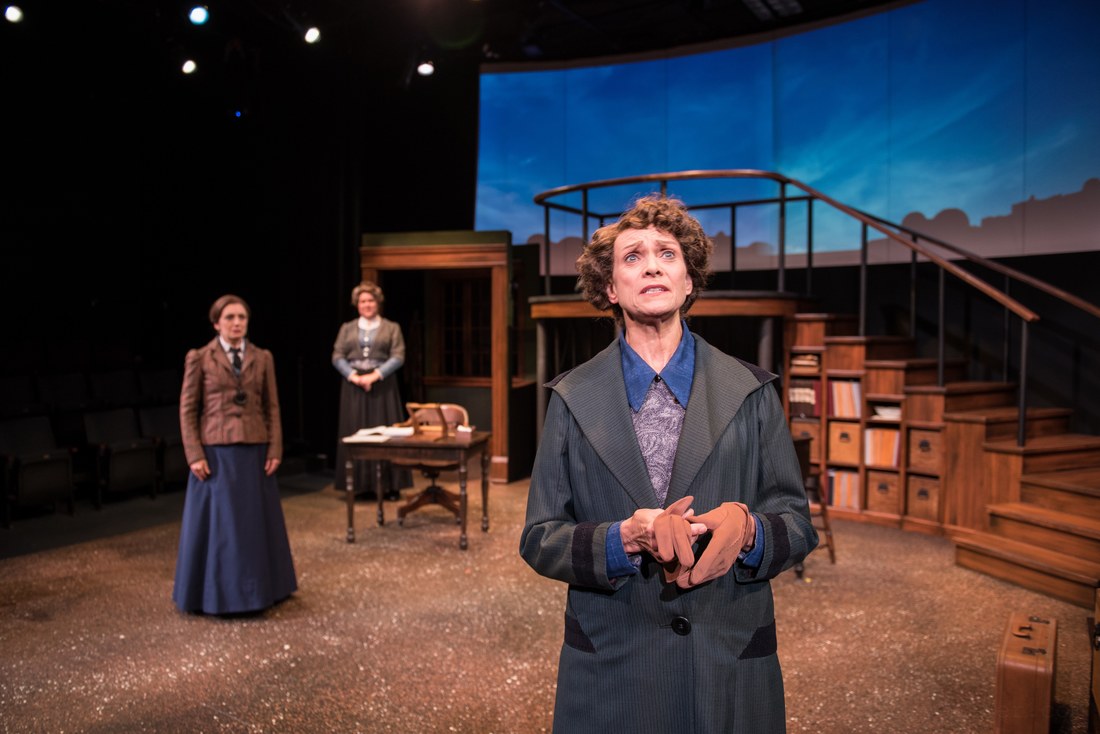|
The universe is old. Our understanding of it isn’t. Astronomy is the toddler constantly trying to impress the universe by telling it exactly how big it really is. Last week I saw a play set in the 16th century in which European academics were dealing with the idea that Earth might not be the center of the universe. Last night I saw a play set in the 20th century in which American academics were dealing with the idea that ours might not be the only galaxy in the universe. Like David Davalos’ Wittenberg (running through the 14th with Windfall Theatre) Lauren Gunderson’s Silent Sky juxtaposes the concerns of a few people against larger intellectual issues that dwarf all comprehension. Next Act Theatre’s production of the drama captures the intensity of one group of people measured against the whole of the universe one star at a time.
Deborah Staples plays Henrietta Swan Leavitt--an astronomer who did work with Cepheid stars which was used to prove that there are other galaxies in the universe. As could be expected of any woman making any kind of important advances in the early 20th century, Leavitt had to deal with institutionalized sexism. It’s a fascinating and inspiring story of someone searching for truth. Staples is suitably heroic in the role. She admirably renders Leavitt’s intellectual passion. The script offers-up the opportunity to deliver a social awkwardness to the stage as well she admirably does so without amplification. It’s a very respectful treatment of a historical figure who deserves a tremendous amount of respect. Carrie Hitchcock plays Annie Jump Cannon. Cannon is a scientific giant in her own right. She developed the stellar spectral classification system that isn’t named after her. Hitchcock has a firm pragmatism about her in the role. In other hands it might come across as cold and domineering, but with Hitchcock it’s swooningly charismatic. Kelly Doherty is brings her characteristically sharp and nuanced grasp of comedy and drama to the role of Williamina Fleming. Fleming was a pioneering astronomer from Scotland working with Cannon and Leavitt who helped catalogue thousands of stars. Doherty deftly wields an earthy Scottish wit tempered against sharply-realized dramatic characterization. A character who could have come across as comic relief is as firmly anchored in depth and complexity as the rest of the cast. Karen Estrada plays contrast to the astronomers in the role of a midwestern housewife who only happens to be Leavitt’s sister. There’s a striking warmth about Estrada in the role that impressively solves the problem of contrasting the world of early 20th century astronomy against the rest of society searching for meaning elsewhere. Reese Madigan is quite capable in the role of Henrietta Leavitt’s love interest Peter Shaw. He’s an awkward middle-management type who grows to appreciate the work of the astronomers in the course of the events of the play. The interpersonal dramas between the characters are solidly played against history and the vastness of the universe as stars are catalogued on glass photographic plates from a massive telescope. Next Act brings the earthbound realities of early 20th century astronomy into a cozy, little studio theatre space. Early 20th century furniture exists in a space with photographic projections of a skies and starscapes. Director David Cecsarini brings it all together quite well in a thoroughly enjoyable, little drama for early Autumn in a comfortable space just outside of a downtown near a big lake in the northern hemisphere of a planet third from a yellow dwarf star spinning around in a spiral galaxy...one of 125 billon in the observable universe. Next Act’s production of Silent Sky runs through Oct. 22 at the Next Act’s space on 255 S. Water St. For ticket reservations and more, visit Next Act online.
0 Comments
Leave a Reply. |
Russ BickerstaffArchives
July 2024
Categories |

 RSS Feed
RSS Feed
